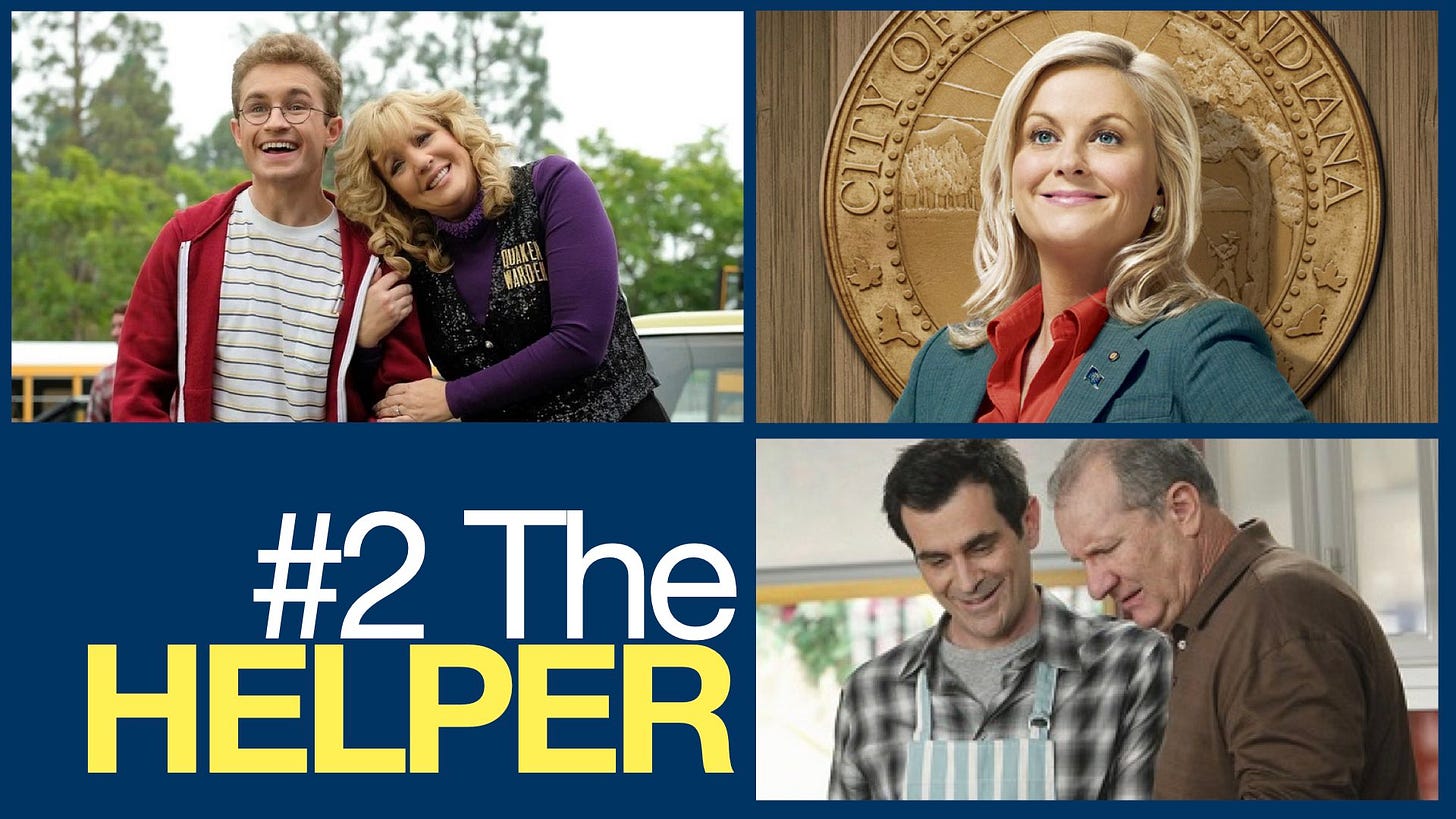Sitcom Character Type #2
The Helper: they just can't help themselves!
There is a YouTube version of this if you’d rather watch that. It’s seven minutes. I’ve put that at the bottom - along with details of my script reading service - as I suspect you’d prefer to read it. So here we go:
Here’s a tip for working out a comedy character: consider how others see this character. That might help us get our heads around our second sitcom character loosely based on the Enneagram. So let’s talk about:
Type 2: The Helper
This character is ‘here to help!’
And they really do want to help. It’s what they live for. Nothing is too much trouble for The Helper. They will drop everything to help you. They will avoid picking up anything in case they need to drop everything to help you. After all, you’d do the same for them, right? RIGHT?
The Helper will always go the extra mile out of their way, although some say they are the ones being walked on. A helper is in danger of being a doormat – or at least seen to be. Other characters might think: Come on, Helper. Where’s your self-respect?!
But Helpers are not doormats or cowards. Not necessarily. They can be really determined. And they may help you whether you like it or not… because you’ll thank them. Be sure to thank them. Send them a card for that gift you didn’t want or they’ll will be offended.
It’s not about being Good
Why do helpers like to help? Is it because they are goodies? No. That’s Type 1. The Goodie likes to help – because it’s the right thing to do. And if they don’t, they’ll feel guilty. And that’s what they really hate. Read about the Goodie here:
The Helper loves to help because the helper loves to be loved. They may not realise this. In fact, they probably don’t. Most of us don’t know why we do things. We all lack self-awareness. (Except me and you, right?) The helper just can’t help themselves. They simply have to help.
This will often be to their own detriment, especially in a sitcom. They may go without sleep or food to help someone. They may give up on the thing they wanted to do for someone else – which makes that other person feel bad when they find out. So quite often they are caught between wanting to help two people at once. And they can’t.
Again, let’s look at them from the point of view of other characters. They might accuse the helper of having low self-esteem. Or meddling, interfering, being a control freak or getting in the way. Others might also accuse the helper of being needy – because they are, in fact, helping others because they want to be needed. So yes, self-esteem is a problem.
Three Helpers
What’s great about a helper in a sitcom is that they are always doing something – and relating to others. This gives you plenty of plot potential and conflicts. This is probably why three great sitcoms have them front and centre. Here are three helpers:
Lesley Nope: the whirlwind of activity who wants to use local government to help as many people as possible. And she is personally, totally invested in it. She also will remember everyone’s birthday, get them gifts and give them wonderful surprises. Lesley is both the best and the worst.
Beverly Goldberg: she will do anything for her children because she loves them so much and, crucially, she needs their love expressed in attention, hugs, kisses and nubbies (yet to be defined). In her head, Beverley’s worked hard enough to earn those hugs. This is, of course, not how love works, as Beverly learns every week.
The helper isn’t necessarily female. Our third exhibit is Phil Dunphy who is, in many ways, a child or puppy in terms of wanting approval. He especially wants it from his father-in-law, Jay, who never quite seems to accept him. Jay doesn’t spend a lot of time thinking about Phil and would never say what Phil wants to hear: tender words of affirmation. He’s not that kind of guy.
And why does Phil do magic? He wants to wow and impress people. He really needs the approval of others, especially his own family.
Stories for Helpers
When thinking up stories for a helper, it’s easy for them to be reactive and to essentially get in the way of the plots of others. Or just be an extra set of hands. In order to make them active, make them think ahead. They are secretly planning all kinds of gifts and surprises for people. And they will also be unable to help themselves from helping too many people at the same time. Desperate not to let anyone down, they will be in serious danger of experiencing their worst nightmare: disapproval. And approval and love is what puts the wind in their wings.
So, let’s wrap with another person in our restaurant sitcom. Let’s call him Brian.
Meet Brian
Brian is essentially the maitre d’. The job is perfect for him because he really wants the customers to have a truly wonderful time. He will do anything to make that happen – and he tries to motivate his staff by making them feel guilty if a customer does not have a good time, which, of course, Brian takes personally.
This will bring Brian into conflict with others because you can’t please all the people all the time. He will also be too generous with discounts and extras to make the customers happy, which puts him in trouble with the owner. But the owner (as yet undefined!) knows he’s got a real treasure on his hands in Brian. In fact, maybe the customers assume Brian is the owner. Is that a problem? It is if the owner is a High Flyer. That’s Type 3. We’ll get to that next time.
Was that helpful? Want more help? Did you know I do offer a script reading service? Which includes a 45-minute Zoom conversation with me about the notes I give you? I tend not to bang on about it. But you can find out more here:





